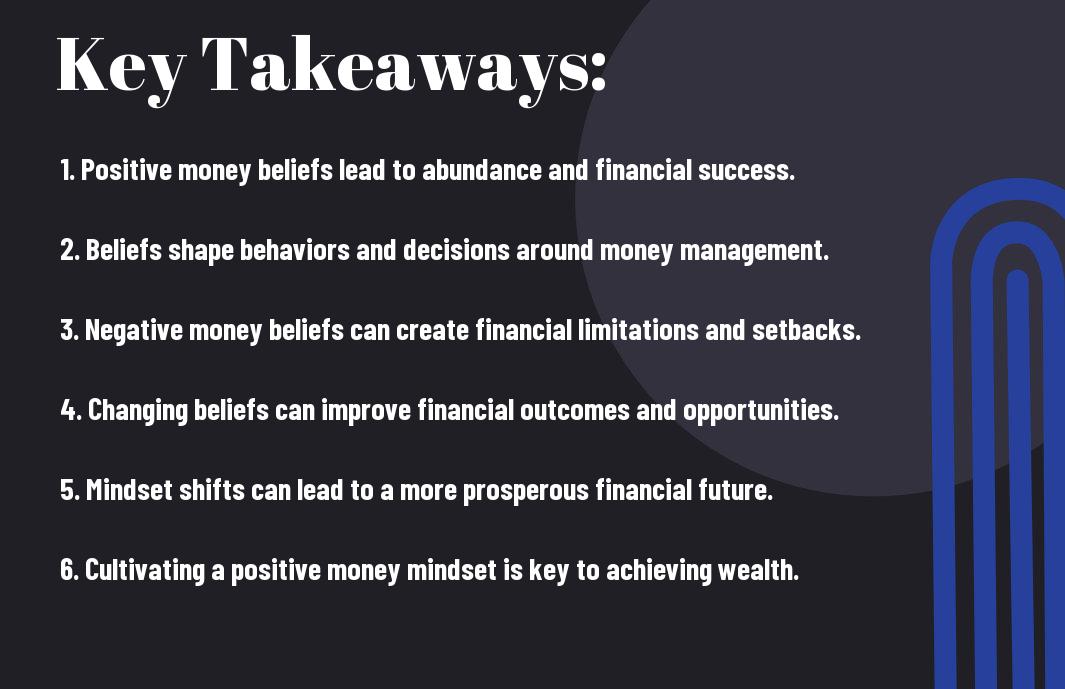You have the power to shape your financial reality through the beliefs you hold about money. Your money mindset can have a profound impact on your financial outcomes, influencing your earning potential, spending habits, and overall financial well-being. By cultivating positive money beliefs, you can create a more abundant and prosperous future for yourself.
Key Takeaways:
- Beliefs shape financial outcomes: Your beliefs about money can either empower you to achieve financial success or hold you back from reaching your full potential.
- Positive money beliefs lead to positive financial outcomes: When you have confidence in your ability to manage money wisely and attract abundance, you are more likely to make smart financial decisions and manifest wealth.
- Challenge limiting beliefs: Identify and challenge any negative beliefs you may have about money, such as “money is evil” or “I will never be rich”, and replace them with empowering beliefs that align with your financial goals.
- Cultivate a growth mindset: Embrace a growth mindset when it comes to money, believing that you can learn and improve your financial skills over time, leading to greater abundance and prosperity.
- Practice gratitude and abundance: Cultivate a sense of gratitude for the money and resources you have, and embrace an abundance mindset to attract more wealth and opportunities into your life.
The Psychology of Money Beliefs
Some experts believe that our money beliefs play a crucial role in shaping our financial reality. These beliefs, formed over time through various experiences and influences, can significantly impact our financial outcomes. Understanding and challenging these beliefs can be the first step towards achieving financial well-being. If you’re interested in how to change your money mindset, check out this resource on How to Change Your Money Mindset.
The Role of Cognitive Biases in Financial Decision-Making
DecisionMaking Our cognitive biases can heavily influence how we make financial decisions. These biases are ingrained thought patterns that can lead us to make irrational choices when it comes to money. For example, confirmation bias may cause us to seek out information that confirms our existing beliefs about money, even if it’s detrimental. By recognizing and addressing these biases, we can make more informed and rational financial decisions.
Conditioning and Its Impact on Financial Perceptions
Financial Our upbringing and past experiences can condition our beliefs and perceptions about money. For example, if we grew up in a household where money was constantly viewed as scarce, we may develop a scarcity mindset that impacts our financial decisions as adults. Recognizing how our conditioning has shaped our financial beliefs can empower us to challenge and change them for the better.
Plus, it’s important to note that our financial beliefs are not set in stone. With awareness and intentional effort, we can reshape these beliefs to support a more positive and successful financial future. By understanding the psychology behind our money beliefs, we can take control of our financial outcomes and shape a reality that aligns with our goals and values.
Unearthing Your Financial Beliefs
Identifying Limiting Beliefs About Money
All of us hold beliefs about money that shape our financial reality. These beliefs can be both positive and negative, influencing how we approach earning, spending, and managing our finances. It’s important to identify any limiting beliefs we may hold about money, as they can hinder our financial growth and success. Common limiting beliefs include thoughts such as “Money is the root of all evil” or “I’ll never be wealthy.” By recognizing these beliefs, we can begin to challenge and change them to create a more abundant mindset.
Methods to Uncover Deep-Seated Financial Mindsets
Delving deeper into our financial beliefs requires introspection and self-awareness. One method to uncover deep-seated financial mindsets is through journaling. By recording our thoughts and feelings about money, we can uncover patterns and recurring beliefs that may be influencing our financial decisions. Another effective method is seeking feedback from trusted friends or a financial advisor. They can offer an outside perspective on our attitudes towards money and help us gain valuable insights into our financial mindset.
Understanding and reshaping our financial beliefs is crucial in creating a positive money mindset. By unearthing our limiting beliefs and using methods to uncover deep-seated financial mindsets, we can pave the way for financial success and abundance.

The Foundations of a Positive Money Mindset
Now, as we explore the impact of beliefs on financial outcomes, it is crucial to understand how our money mindset shapes our reality. Beliefs play a significant role in determining our financial success, as highlighted in the blog post The Power of Belief: How Your Mindset Shapes Your World.
Principles of a Healthy Financial Belief System
Principles of a healthy financial belief system encompass fundamental ideas that form the basis of a positive money mindset. These principles include cultivating gratitude for what you have, believing in your ability to achieve financial goals, and maintaining a growth mindset that embraces learning from financial setbacks. By internalizing these beliefs, individuals can shift their perspective towards abundance and prosperity, paving the way for financial success.
Techniques to Cultivate Abundance and Prosperity Thinking
Money mindset plays a crucial role in shaping one’s financial reality. Techniques to cultivate abundance and prosperity thinking include practicing visualization of financial goals, affirming positive money beliefs daily, and surrounding yourself with individuals who support your financial growth. These techniques can help reprogram your subconscious mind for financial success and attract wealth and prosperity into your life.
With a foundation built on positive money beliefs and a commitment to actively shaping your financial reality, individuals can overcome limiting beliefs and achieve their financial goals with confidence and certainty. By implementing these techniques consistently, individuals can transform their relationship with money and create a mindset that attracts abundance and prosperity.

Transforming Your Financial Reality Through Belief
The Process of Reframing Negative Money Beliefs
Unlike what some may believe, our financial outcomes are deeply influenced by our beliefs about money. One of the first steps in transforming your financial reality is to identify and reframe any negative money beliefs that may be holding you back. These beliefs can manifest as thoughts such as “I will never be able to save enough money” or “Money is the root of all evil.”
Success Stories: Inspiring Examples of Transformed Financial Outlooks
On the flip side, there are numerous success stories of individuals who have changed their financial reality by reshaping their beliefs about money. By adopting positive money beliefs such as “I am capable of creating wealth” or “Money flows easily to me,” people have been able to attract abundance and financial success into their lives.
Beliefs play a significant role in shaping our financial outcomes. By recognizing and changing limiting beliefs, we can open ourselves up to a world of possibilities and abundance.
It is truly remarkable to witness the transformation that can occur when individuals shift their mindset and believe in their financial potential. Success stories serve as a powerful reminder of the impact beliefs can have on our financial reality.
Overcoming Financial Fears and Developing Confidence
Despite the many challenges that may come our way, overcoming financial fears and developing confidence in our financial decisions is crucial for building a secure financial future. Financial anxiety can often lead to poor money management and decision-making, ultimately impacting our financial outcomes. It is important to address these fears head-on and develop strategies to manage them effectively.
Strategies for Managing Financial Anxiety
Financial anxiety can manifest in various ways, whether it be the fear of not having enough savings, worries about debt, or concerns about the future. To combat these fears, it is important to first identify the root cause of the anxiety. Creating a budget, setting financial goals, and seeking support from a financial advisor or therapist can all be effective strategies in managing and alleviating financial anxiety.
Building Financial Self-Efficacy through Positive Beliefs
Positive money beliefs can play a significant role in shaping our financial reality. Research has shown that individuals with high levels of financial self-efficacy tend to exhibit better financial behaviors and outcomes. By cultivating positive beliefs about money and our ability to manage it effectively, we can enhance our financial confidence and decision-making skills.
Strategies for building financial self-efficacy through positive beliefs may include challenging negative money beliefs, reframing financial challenges as opportunities for growth, and setting realistic financial goals to boost confidence in our ability to achieve them.

Practical Application of Belief-Based Financial Strategies
Many financial experts emphasize the critical role beliefs play in shaping financial outcomes. In episode 8 of “The Power of Belief: How Your Mindset Shapes …,” the importance of positive money beliefs is highlighted. These beliefs can have a profound impact on financial decisions and behaviors, ultimately shaping one’s financial reality. Incorporating mindset work into financial planning is important for creating a strong foundation for financial success.
Incorporating Mindset Work into Financial Planning
Incorporating mindset work into financial planning involves recognizing and addressing limiting beliefs surrounding money. By actively challenging negative beliefs and adopting positive money mindsets, individuals can make more informed financial decisions and take actions aligned with their financial goals. This proactive approach to mindset work can lead to greater financial confidence and empowerment, ultimately paving the way for long-term financial success.
The Role of Consistency in Shaping Long-Term Financial Health
To achieve long-term financial health, consistency is key. Consistently practicing positive money beliefs and behaviors can help individuals build sustainable financial habits that support their goals over time. Establishing a routine of mindful financial practices, such as budgeting, saving, and investing, can contribute significantly to long-term financial stability and growth. By maintaining consistency in financial planning and decision-making, individuals can cultivate a strong financial foundation for a secure future.
Mindset plays a crucial role in shaping financial outcomes, as beliefs and attitudes about money can directly influence financial behaviors and decisions. By adopting positive money mindsets and consistently practicing healthy financial habits, individuals can proactively shape their financial reality for long-term success.
Nurturing a Future of Financial Well-Being
Maintaining a Dynamic and Adaptable Money Mindset
Adaptable money mindsets are crucial in navigating the ever-changing landscape of personal finance. By embracing flexibility and openness to new ideas, individuals can better respond to financial challenges and opportunities. Research has shown that those with a growth mindset towards money are more likely to achieve long-term financial success and stability.
Future Trends in Belief and Finance
WellBeing in financial well-being is closely linked to one’s beliefs and attitudes towards money. As we look towards the future, it is important to consider the evolving trends in belief and finance. With advancements in technology and a shifting global economy, individuals must continue to adapt their money mindsets to stay ahead of the curve and secure their financial futures.

Summing up
Conclusively, the impact of beliefs on financial outcomes cannot be understated. The power of shaping your reality through positive money beliefs is immense. By adopting a mindset that sees money as a tool for growth and abundance, individuals can attract opportunities for wealth and success. Beliefs have the power to shape our actions and decisions, ultimately influencing our financial outcomes. It is crucial to recognize the significance of positive money beliefs and work towards cultivating a mindset that aligns with financial prosperity.




